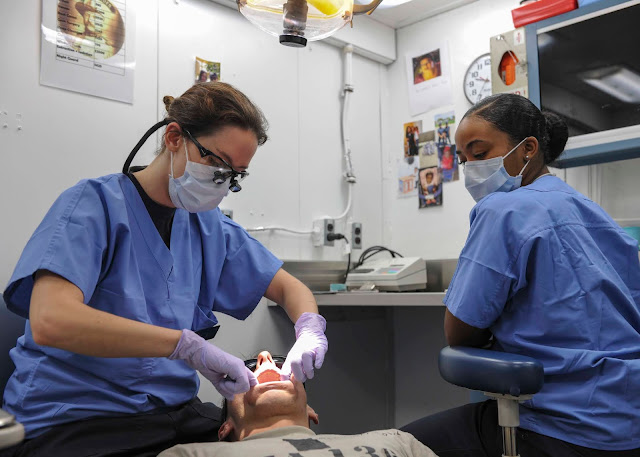New Advanced Practice Dentists Embark on Research, Clinical Pursuits
By Sarah Marshall
The Uniformed Services University’s (USU) Postgraduate Dental College (PDC) recently graduated 78 students from its programs across the country. Not only did these grads find ways to make their way across the stage “virtually” in the midst of a global pandemic, they have also made remarkable strides in dental research that will ultimately help improve readiness.
USU’s PDC was established in 2010 to educate uniformed graduate dentists as future leaders in military operational environments, federal health systems and university settings. USU grants a Master of Science in Oral Biology degree to dental residents after they successfully complete their specialty training, giving a sound scientific basis to the curriculum and helping these providers to embark upon a career of evidence-based clinical practice. The first degrees were awarded in 2012.
The dental college consists of six educational sites across the country that fall under three service dentalschools -- the Army, Navy, and Air Force Postgraduate Dental Schools. This year, the Army graduated 33 students, the Navy graduated 21, and the Air Force graduated 24. Graduation ceremonies took place in a variety of forums -- some virtual, some pre-recorded. Regardless of how they “walked” across their virtual stage, all students were recognized, and will continue service as leaders in military dental health, said Dr. Thomas Schneid, executive dean of USU’s PDC.
“PDC grads are predominantly going to be clinical specialists and will be the clinical experts in their specialty after they graduate,” Schneid said. “A smaller number will be moving into education where they will be teaching others their specialty.”
Fortunately, the pandemic did not slow them down, he added. PDC students were able to use a hybrid learning model – part virtual, part hands-on -- and many had already completed most of the requirements for graduation.
 |
| Newest USU MS Degree in Oral Biology recipients from the Keesler AFB Endodontics Residency (Right to Left) - Major Jason Rose, graduate; Lt. Col. Steven Black, Program Director; Major Scott Bryant, graduate. (Uniformed Services University photo) |
All PDC students are involved in compelling research, and each year the services identify their top research project, Schneid said. This year, Lt. Cmdr. Kerry B. Baumann was awarded the Navy’s research prize for her studies looking at tongue fat and obstructive sleep apnea. Her project was done in collaboration with USU’s Department of Anatomy, Physiology and Genetics, and the Surgery department’s Otolaryngology division, and was part of a larger study with researchers at Harvard. Tongue size and obesity have been directly correlated with obstructive sleep apnea, a serious sleep disorder which can cause daytime drowsiness. She found that a majority of adipose tissue in the tongue (loose connective, or fat, tissue) is mainly found on the bottom surface area of the tongue. By accurately pinpointing the location of this tissue, it could potentially help target therapies to treat obstructive sleep apnea.
“It was a good interdisciplinary topic that addresses a true readiness issue,” Schneid said.
Maj. Bracken G. Smith was recognized by the Air Force for his research, “Targeted Endodontic Microsurgery - Implications for the Greater Palatine Artery.” This project looked at the use of CT scans to help endodontists perform surgery on patients with the roots of their teeth embedded in their jaw. These scans are translated into a 3D printer to fabricate a plastic surgical guide. The guide is then placed in a patient’s mouth to guide the surgeon’s instruments, thus targeting the exact area for the procedure.
“This research has really revolutionized the way this type of dental surgery is conducted,” Schneid said.“It will be conducted more safely and with greater success rate.”
PDC graduates from Army dental residencies also conducted research in a variety of areas, such as infection control in the deployed environment, opioid prescribing practices of military dentists, disease prevention, dental materials, use of digital technology for dental prosthetics, and periodontal surgery to improve the success of dental implants. All of these topics have readiness implications related to ensuring the availability of a medically ready warfighter, Schneid said. The top Army project is expected to be announced in the fall.
In addition to the students who were recognized for their research, multiple PDC students and faculty have published papers in peer-reviewed journals, many based on their USU master’s degree work. A number of them have made it to the cover of several prestigious dental journals, Schneid added.
“It’s certainly been an interesting year for the PDC, but we’re very proud of the research efforts by our students and faculty,” Schneid said. “We look forward to the numerous publications that will be generated from these stellar research efforts. Most importantly, I’m confident that the critical thinking and problem solving skills learned during the research component of their curriculum will make these graduates better officers, leaders and dental specialists in any role they may take within the Military Health System."






